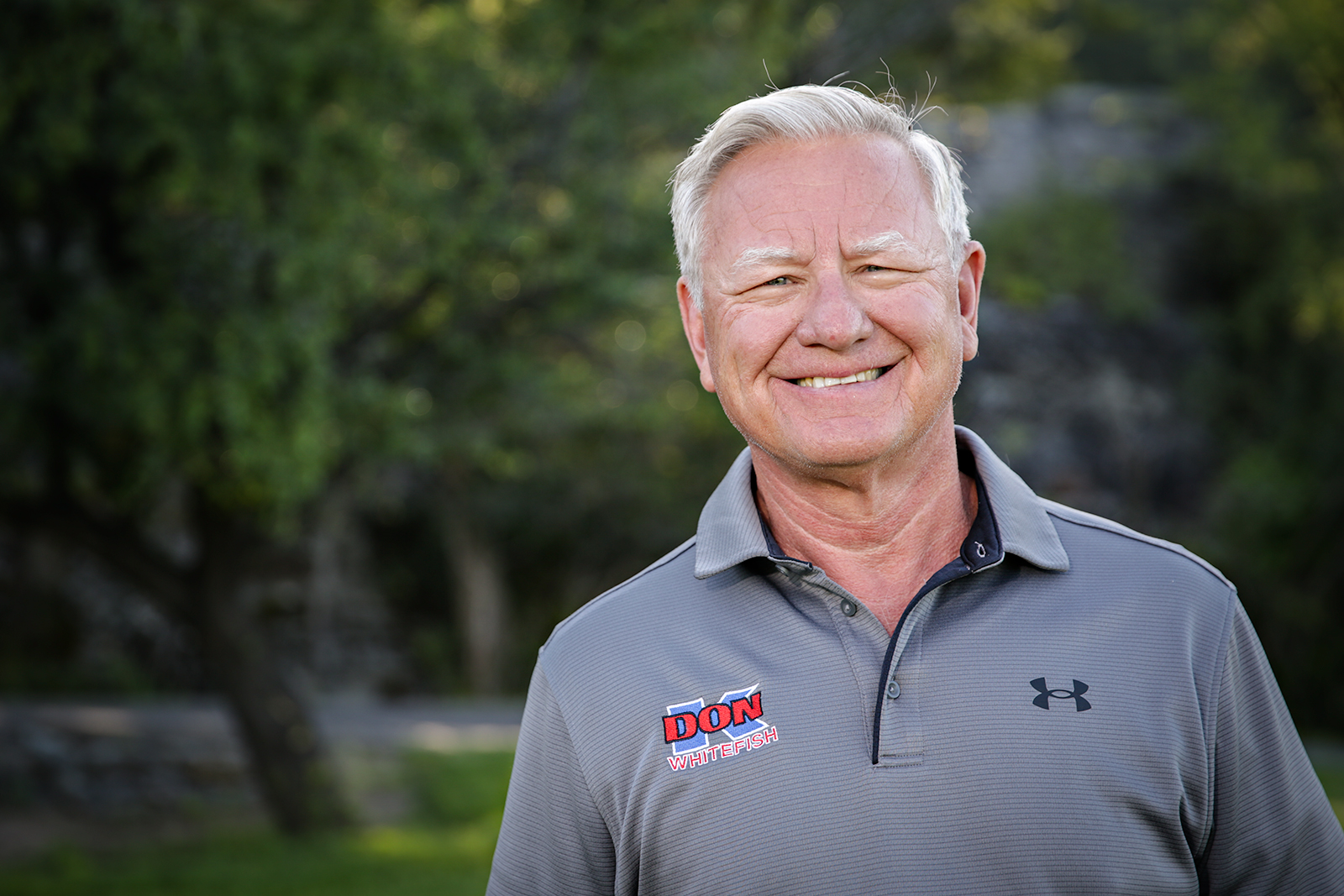‘We’re Better Together’: Outgoing Montana GOP Chair Reflects on What Unites — and Divides — the Party
Over six years, Kaltschmidt's leadership of the Republican Party helped turn Montana into a "red state." But with internal conflicts and new leadership, the party he's leaving behind is grappling with how to use its recent dominance to govern.
By Mariah Thomas
Don “K” Kaltschmidt doesn’t like to lose. While he was chair of Montana’s Republican Party, he didn’t do it often.
A Flathead High graduate, a veteran, a local businessman and, as of June, the former chair of Montana’s Republican Party, Kaltschmidt led the GOP as Montana’s political winds underwent a change. The state, long-regarded as a purple one with a predilection for split-ticket voting, is now vividly red.
Analysts have attributed the shifts in the state’s political fabric to a variety of factors including nationalization of politics and the political alignments of those moving to the state.
Those shifts were met with a Republican Party that, by some accounts, transformed into a juggernaut under Kaltschmidt’s leadership. Party chairs set the party’s direction, lead fundraising efforts and, overall, are tasked with getting their party elected.
“Don Kaltschmidt didn’t just lead the Montana Republican Party — he transformed it,” U.S. Sen. Steve Daines said. “… By the end of Don’s tenure, every statewide constitutional office and our entire congressional delegation was Republican — something that had never happened before in Montana’s history.
“That kind of success doesn’t happen by accident. It takes hard work, vision, and the ability to unite people around a common cause. Don brought all of that — and more.”
When Kaltschmidt took over as chair in 2019, he described the GOP as a “six-month party,” coming alive for election seasons and then hibernating in cyclical fashion. As Kaltschmidt walks away, he’s handed off a party that has developed what he referred to as a 24/7 mindset.
But that doesn’t mean it’s perfectly aligned. Intra-party fighting has become a major storyline for the GOP, most recently as Kaltschmidt’s successor, Art Wittich, was elected at the party’s convention in June. Nine state senators were denied a vote in the process after earning the ire of the party for siding with Democrats during the legislative session. They have since demanded a revote.
“My slogan while I was the chair was, ‘We’re better together,’” Kaltschmidt said. “And I always believed that. We have different factions in the party — we have a moderate wing, we have a conservative wing and we have a libertarian wing. And we need to get along together to move the state toward pragmatic conservatism.”
By “pragmatic conservatism,” Kaltschmidt means the Republican Party should promote policies championing low taxes, small government and small businesses. Even with a wide net of beliefs falling under the Republican Party umbrella, the bottom line for Kaltschmidt is that most people in Montana are right-of-center. His party’s job is to represent that viewpoint.
Kaltschmidt has owned Don K Chevrolet Chrysler Subaru, a Whitefish car dealership, since 1990. As a small business owner, Kaltschmidt said he was always somewhat involved in politics.
That activity ramped up when he joined the National Auto Dealers Association, a lobbying group that advocates for the interests of more than 16,000 car dealerships. Kaltschmidt said he was involved with that lobbying group for 10 years, advocating at both the state and federal level for those interests.
My slogan while I was the chair was, ‘we’re better together.’ And I always believed that.
Don “K” Kaltschmidt, former chair of Montana’s Republican Party
Then, in 2016, he launched a bid for a state Senate seat against Keith Regier. Regier, whose family looms large in the state legislature and in local politics (his daughter Amy is a representative in the House and his son Matt was the Senate president this year, all three from Kalispell), beat Kaltschmidt in the primary by about 100 votes. Regier went on to hold the seat through the 2023 legislative session.
“I learned a lot from that loss,” Kaltschmidt said. “In fact, probably the success we had in the Republican Party is because of that loss, because I had to look at the mirror and I said, ‘okay I am going to learn how to do this.’”
After running for office, Kaltschmidt said he regularly supported Republican candidates and was personal friends with many, including Daines. It was Daines who Kaltschmidt said encouraged him to run for the party chair position in 2019.
Daines spokesperson Jason Thielman confirmed that the senator encouraged Kaltschmidt to run. In an email, Thielman stated Daines believed Kaltschmidt had “the right mix of leadership skills, business experience and deep commitment to conservative values that Montana needed to take the Republican Party to the next level.”
“As a successful entrepreneur, a Marine and a trusted voice in his community, Don brought a no-nonsense, mission-focused approach to everything he touched,” Thielman wrote. “The Senator knew he would bring that same drive to the party — and he did.”
For Kaltschmidt’s part, his concern was doing things right if he took over.
“I said, ‘I’ll do it, but you’ve got to help me raise money, because we’re going to win everything. We are not going to lose,’” Kaltschmidt said.
During the 2015-2016 election cycle, the last presidential election cycle before Kaltschmidt took over, the Montana Republican State Central Committee raised $1,211,571.90.
After Kaltschmidt took over during the 2019-2020 cycle, the central committee raked in $5,533,904.83. It was that 2020 election that showed him he was doing something right as the party chair.
Republicans won every statewide position down the ballot by wide margins. For Kaltschmidt, the most significant win was the superintendent of public instruction. That position had been held by Democrats for nearly 30 years prior to 2016.
In 2016, Elsie Arntzen bested Democratic challenger Melissa Romano by a narrow margin of 16,200 votes, around a 3% difference. In 2020, Arntzen won re-election by eight points. That race was the closest result statewide.
Kaltschmidt nearly stepped down after that election cycle. He’d achieved a clean sweep. But he was encouraged to stay on, with a goal of delivering one more win: the GOP wanted to take down U.S. Sen. Jon Tester, the last Democratic statewide officeholder.

Kaltschmidt saw 2022 as a litmus test for that aim. He didn’t feel that he emerged victorious.
“In ’22, even though we won, it wasn’t a great cycle for us, really, in my opinion, because I like to win by a lot,” Kaltschmidt said.
Democrat Monica Tranel ran within four points of Rep. Ryan Zinke, a margin too close for Kaltschmidt’s liking. And despite the party throwing its support behind James Brown for a seat on the state’s Supreme Court — a move that ran counter to political norms — incumbent Justice Ingrid Gustafson handily defeated him.
Republicans emerged out of that election cycle with a supermajority at the state legislature in the spring of 2023. But Kaltschmidt said the supermajority didn’t deliver on several key goals, among them passing legislation to allow Supreme Court justices to run under a party affiliation. Supreme Court justices in Montana have historically been nonpartisan positions.
Factions of the Republican party have raised concerns that some district court justices and the state Supreme Court have a liberal bias or are legislating from the bench. Kaltschmidt agrees with that assessment. By making it optional to run under the guise of a party, he thinks voters can better understand where a justice’s leanings fall. That topic came up again in 2025’s session. The GOP no longer had a supermajority, and a coalition of Democrats and moderate Republicans in both chambers shot down the legislation.
Kaltschmidt took the blame for the supermajority’s less-than-ideal performance, citing insufficient experience navigating the halls of the capitol in Helena — he never worked as a legislator — and not pushing GOP legislators hard enough to fall within the party lines.
Supermajority rule isn’t an opportunity Kaltschmidt expects to come again following redistricting in 2022. The redistricting commission selected a map Democrats advocated for, which held more competitive seats in the legislature for that party.

In 2023, the GOP also voted to rebuke former Republican Montana Gov. Marc Racicot.
“The internal politics is very difficult to navigate,” Kaltschmidt said. “That’s not my strong suit. My strong suit is having a mission and accomplishing the mission. I don’t like dealing with the internal politics and the infighting and the power grabbing and all that stuff. I’m just here for the team.”
Kaltschmidt said he didn’t vote on Racicot’s rebuke. As chair, his job was mostly tie-breaking, and most of the executive board agreed on that rebuke. Kaltschmidt said he didn’t like having to rebuke the former governor, whom he called a personal friend. Still, he supported the executive board’s choice.
He signed a letter on behalf of the party stating the former governor was “not considered by the MTGOP to be a Republican” and “does not have the support of the party.” The action followed several Racicot endorsements of figures outside the GOP.
Namely, Racicot — who formerly served as chairman of the Republican National Committee — endorsed Democrat Tranel in the 2022 House Congressional race; Gustafson in the 2022 Montana Supreme Court race; Joe Biden in the 2020 presidential race; and supported Justice Ketanji Brown Jackson’s nomination to the U.S. Supreme Court.
“I had conversations with him, and I would talk to him and say, ‘Marc, you know, we need you to come back into the fold. You know, if you can’t support one of our candidates, I understand, but if you’re a Republican, just shut your mouth. Don’t endorse the other candidate. Just be quiet. That’s what you have to do. You don’t have to be disingenuous, but you know, you’re a former Republican governor,’” Kaltschmidt said.
Racicot previously told the Beacon bipartisanship had been a theme throughout his career. But the Republican Party’s consolidation of power combined with Trump-era conservatism ran against his values. He saw them as threatening the balance of powers in Montana’s constitution.
It would not be the only time intra-party conflicts arose during Kaltschmidt’s tenure.

Still, it was a team effort that took center stage in 2024, as the GOP took aim at flipping a U.S. Senate seat.
“I know Jon Tester and I like Jon Tester as a person, but I don’t like his politics,” Kaltschmidt said. “But I really admire him because of how he got Republicans to vote for him. So, I had in my mind that we’re going to turn that around.”
Daines helmed the National Republican Senatorial Committee and helped choose Tester’s challenger, Tim Sheehy.
“Tim is a really smart guy,” Kaltschmidt said. “He has money. He’s a good-looking guy, he’s got a great family. He’s the real deal … Perfect for Montana. Perfect candidate.”
Kaltschmidt credited Tester with having an excellent “ground game.” In elections, that refers to a campaign’s ability to gain voters’ support and turn them out to the polls.
Kaltschmidt took a page out of that playbook in his effort to flip Tester’s seat. His party had worked on developing a strong ground game in both 2020 and 2022. In 2024, it ramped up even more, thanks to a record-setting Senate race in Montana.
More than $270 million flowed into the state as Democrats tried to cling to Tester’s seat and the GOP targeted it for a flip. The Republican State Central Committee was flush with nearly $25 million in cash receipts.
Kaltschmidt viewed the race as “bottom-up.” The party ran candidates in every race they could recruit one for. Republicans knocked doors, talked with voters on the phone and targeted Republican voters with voter registration efforts.
It worked. Sheehy bested Tester by a margin of eight points. It wasn’t only Sheehy who won. Similarly to 2020, the GOP swept every statewide office, sent a full Republican slate of delegates to represent Montana at the federal level and maintained control over both houses of the state legislature.

But during this year’s legislative session, that story of Republican dominance didn’t translate. Instead, bipartisanship emerged as the session’s theme, thanks to a coalition of moderate Republicans who sided with Democrats to block changes to the judiciary branch in the state, keep Medicaid expansion in Montana and pass property tax reform.
The Republican Party voted to rebuke nine members of the Senate early in the session — Butch Gillespie, Gregg Hunter, Josh Kassmier, Gayle Lammers, Denley Loge, Wendy McKamey, Russ Tempel and Shelley Vance — for aligning with Democrats and “creating obstacles for the Republican majority in the Senate.” It did not do the same for representatives who similarly voted outside party lines in the House.
There can be areas of consensus with Democrats, Kaltschmidt said. He pointed to public lands as an issue where the two parties often find alignment, and said he has no issue with senators and representatives voting outside the party line sometimes. The problem with the nine, in his view, was that they undermined Senate leadership to do so.
“I believe we need to support who is elected, even though we might disagree with them,” Kaltschmidt said. “It’s okay to say, ‘I disagree.’ But you can’t go over to the Democrats … The Senate minority leader (Pat Flowers), it was basically him and a Republican were basically running the Senate this time because that’s where the 26 votes were.”
Kyle Schmauch, the communications director for Senate Republicans, declined to comment on the intra-party dynamics of the Senate, or on the suggestion that the reason for the rebuke was due to undermining Senate leadership.
The frustration with those nine senators spilled over outside the bounds of the legislative session. At the party’s convention in June — the same one where Kaltschmidt officially stepped out of the chairmanship — the GOP voted not to allow the nine to participate in votes for new leadership.
Kaltschmidt tried to rule the senator who made the motion not to allow them to vote, Barry Usher, R-Molt, out of order. Rep. Jane Gillette, R-Three Forks, led a vote to override Kaltschmidt.
Montana’s becoming a red state and I think the voters want us to be even a redder state.
Art Wittich, chair of the Montana Republican Party
The nine senators offered a written protest to the actions from a lawyer. The letter contained a “demand for immediate action to set aside any measure or action taken without (the senators’) voice.”
Art Wittich, the newly-elected Republican Party chair, said their complaints have been referred to the party’s rules committee for consideration. He would not speculate as to how the rules committee would act on the complaint.
Kaltschmidt said undermining leadership comes with consequences — from the party’s rebuke to potential primary challenges.
Wittich, who is Kaltschmidt’s successor as party chair, has long been involved in Republican politics in Montana. He’s practiced law in the state since 1985 and worked as an environmental lawyer for former Republican Gov. Stan Stephens. He has served as both a state senator and state representative. In 2016, a state district court jury found Wittich guilty of violating campaign finance laws during a primary election.
Wittich chose to run for chair of the GOP after urging from “a number of people,” he said. He won election at this year’s leadership convention handily. Among his ideas for party leadership, the Montana Free Press reported, were strategies like creating a red policy committee to research legislative proposals, and a conservative governance committee to vet and endorse Republican candidates.
“The party wants to reflect Montana voters, and Montana voters have clearly shown the trend line is to the right,” Wittich said. “Montana’s becoming a red state and I think the voters want us to be even a redder state.”
Wittich said those committees have already been created. The red policy committee will work on crafting policy in between legislative sessions. The conservative governance committee will focus on ensuring conservative parts of the state have representatives who align with their views.
Mainly, that effort includes recruiting candidates, but Wittich didn’t rule out the possibility of involving the party in primaries to back more-conservative candidates in some districts.
While involving himself in primaries wasn’t Kaltschmidt’s style, he said he thinks Wittich is the right person to lead the party into its next phase. One of Wittich’s goals during his tenure is solving what he called “some dysfunction” in the state legislature. That’s the right direction, Kaltschmidt said. The GOP needs to figure out how to turn electoral wins into policy wins, in his eyes.
And Kaltschmidt thinks little stands in the Republican Party’s way in that pursuit — except, perhaps, themselves.
“I think we’re in a very, very good position,” Kaltschmidt said. “I think if we infight too much, then we could blow it up.”
As Kaltschmidt steps away from the party chairmanship, he said he plans to help Flathead County District Court Judge Dan Wilson in his race for the state Supreme Court. He also looks forward to working with his family’s foundation, spending time in the outdoors and being with family.